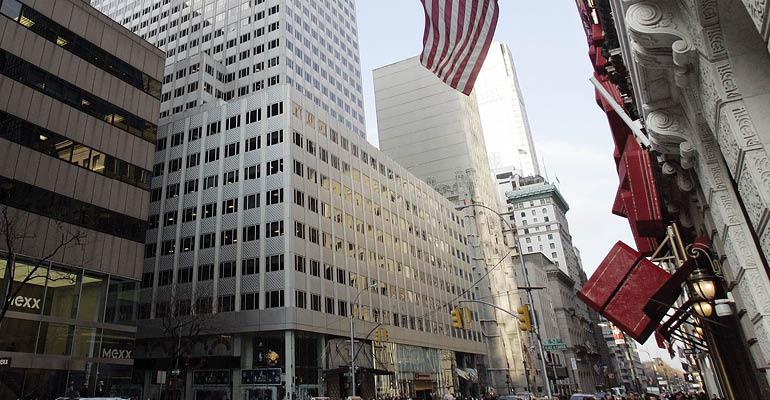(Bloomberg)—Just over a year ago, Anbang Insurance Group Co. was the undisputed leader of a band of aggressive Chinese investors pushing into overseas deals. Not anymore.
The unraveling of a potential deal to redevelop a Manhattan tower with links to President Donald Trump’s son-in-law Jared Kushner is the latest in a series of stumbles by the Beijing-based insurer. Anbang, which abruptly pulled out of a major hotel acquisition last year, also struggled to win regulatory approval to close its purchase of a U.S. insurer in a deal that looks all but dead.
The rough patch marks a setback for Anbang, whose surging life insurance premiums helped power a buying spree from South Korea to the Netherlands, with $30 billion in planned deals. It also casts a pall over its planned initial public offering as the company’s ability to pull off high-profile acquisitions comes into question. In the last six months, Anbang has announced the closing of one overseas deal -- the purchase of Seoul-based insurer Tongyang Life Insurance Co., according to data compiled by Bloomberg.
“While nobody can get all deals done, more failed deals could undermine Anbang’s reputation as a capable acquirer,” said Frank Hong, a Beijing-based partner at Dorsey & Whitney LLP who specializes in areas including mergers and acquisitions. “Counterparties in the future may wonder if something unexpected could happen and jeopardize their deal too.”
Very ‘Prudent’
Anbang has a few hundred managers searching overseas investment opportunities and looks at more than 1,000 potential deals a year, but the ratio of completed ones is “very low,” Chairman Wu Xiaohui said at the Boao Forum for Asia last week. The company is very “prudent” and only invests in projects that can bring returns higher than 10 percent, and all its overseas investments have been profitable, he said.
The company walked away from its $12.9 billion bid for Starwood Hotels & Resorts Worldwide Inc. last April and it missed deadlines to complete the acquisition of Fidelity & Guaranty Life as New York regulators expressed reservations about its ownership structure. Another hotel deal near a major U.S. naval base was called off in October following opposition from national security officials, people familiar with the matter said at the time.
‘Sensitive Deals’
“Those were all fairly sensitive deals,” said Zhou Min, a Hong Kong-based analyst at Sanford C. Bernstein & Co. “If Anbang only pursued purely commercial deals, and leveraged the offshore resources to finance them, it won’t have found itself in such a situation.”
Anbang’s reversal coincides with the emergence of another aggressive Chinese acquirer, HNA Group Co., which has snapped up stakes in hotel chains such as Hilton Worldwide Holdings Inc. and U.S. money managers such as Skybridge Capital. HNA has announced at least $19 billion of deals over the past six months, according to data compiled by Bloomberg.
The failure of the latest deal with Kushner highlights how the political climate in the U.S. has become more charged as the business dealings of Trump and his family attract scrutiny. Chinese investments in companies or properties with connections to Trump have prompted questions about conflicts of interest.
Five Democratic lawmakers raised ethics concerns about the Chinese firm’s potential investment in the Manhattan tower, asking the White House in a March 24 letter to explain whether Kushner was involved in any talks about the possible partnership with Anbang and for additional details on Kushner’s divestment from his family’s company.
Anbang and Kushner Cos. “mutually agreed” to end talks to redevelop 666 Fifth Avenue, a spokesman said in an emailed statement Wednesday. Anbang had discussed a payment of $400 million to Kushner Cos. as part of a $4 billion transaction that may have included terms that some real estate experts considered unusually favorable for the Kushners, Bloomberg reported earlier this month. Anbang declined to comment.
China’s Clampdown
It’s not just U.S. lawmakers scrutinizing cross-border deals. China’s regulators have clamped down on overseas acquisitions by mainland companies as they seek to stabilize the currency. At the same time, China is also seeking to rein in risks in the insurance business.
Chinese insurers’ overseas acquisitions have slowed due to the capital controls, Qian Zhu, a Shanghai-based vice president at Moody’s Investors Service, told reporters in Beijing on Wednesday, citing the rating company’s conversations with insurers. Demand for overseas investments remains “very strong” and the slowdown in deals should be “relatively short-term,” as insurers wait for better timing, she said.
Still, such controls should have a limited impact on Anbang, which has already bought insurers in Europe and Asia that keep generating revenue in foreign currencies. Anbang doesn’t use China’s foreign exchange quotas for overseas acquisitions, Anbang’s Wu said at the Boao forum.
While Anbang is still looking for new deals, the insurer is also spending more time digesting its acquisitions, Vice Chairman Yao Dafeng said in an interview in September. The companies acquired include South Korea’s Tongyang Life, Dutch insurer Vivat, Belgium lender Nagelmackers and insurer Fidea NV.
--With assistance from Keri Geiger.To contact Bloomberg News staff for this story: Zhang Dingmin in Beijing at [email protected] To contact the editors responsible for this story: Sree Vidya Bhaktavatsalam at [email protected] ;Ben Scent at [email protected] Christian Baumgaertel
COPYRIGHT
© 2017 Bloomberg L.P

